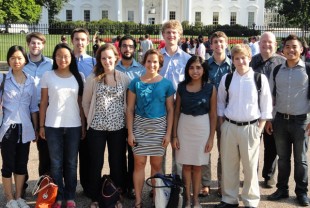It’s not everyday that engineers get to make Washington, D.C., their intellectual workshop. This summer, three Rice engineering undergraduates lent their problem-solving skills to public service through the Baker Institute’s Summer in D.C. Internship Program, made possible by the tireless mentorship of faculty coordinator Steven Lewis and the generous support from the Rice Center for Engineering Leadership.

Junior Andrew Amis (front row, right), a chemical engineering and history major, was among a dozen students who spent the summer in Washington with the Baker Institute's Summer in D.C. Internship Program. He encourages budding scientists and engineers to apply their technical training to public service.
We — a dozen of us total in the fellowship program — gathered around chicken bento and miso soup to the tune of six books on social, economic and political theory — thrice over the summer with a new serving of readings for each discussion. Niall Ferguson was served as the appetizer; the entrée, Schumpeter with a dash of Hayek; and for dessert, a strong dose of Sassen. Engineers can be carnivores for books, too.
And we dipped our toes in the cultural and intellectual scenery of the Beltway as well. At the Kennedy Center, for example, I heard John Newton’s mastery put to bagpipes alongside the South African freedom song “Bawo, Thixo Somandla” and Wesley’s “Idumea.” My time was consumed by conversations with interesting people on topics of global nature: foreign affairs with Congressman Pete Olson (a 1985 Rice alumnus trained in computer science), the potential for peace with an Iranian chemistry professor, famine prevention and humanitarian satellite systems with State Department technology wonks, science diplomacy with an Uzbek Embassy counselor, and international field work with the science and technology adviser to the U.S. Agency for International Development (USAID), to name a handful. It was like getting golf tips from Luke Donald or Ernie Els! Their wealth of advice and insight was invaluable.
I discovered from my conversations in Washington that technology is a critical piece to solving every problem in the world. Consider the late Rice Professor Richard Smalley’s 10 grand challenges, or the initiative of groups like Google Ideas. Energy, health, food, water and space: Engineers build modern civilization and have a role to play in its application. But it is also critical to calibrate technical engineering chops with the arts of history, public policy and global affairs. This links workable strategies with grand vision.
There is a place in the policy world for this technical craft. In fact, Presidents Hoover and Carter were both trained as engineers. There’s also Benjamin Franklin, notable inventor-turned-statesman. Science and engineering are critical to advising governments on technical issues (Office of Science and Technology Policy, National Academies), improving relationships with foreign nations (American Association for the Advancement of Science Center for Science Diplomacy) and building capacity for the world’s poorest (State Department, USAID), along with its richest.
Washington needs engineers who can explain why it matters that NASA’s Jet Propulsion Laboratory landed a rover on Mars. It’s up to our engineers to validate the potential of modern energy technologies, to forge international partnerships in space and to translate new technologies for the developing world into good foreign policy. It’s crucial to bridge the gap between technology and policy by bringing innovation to the public arena and relaying accurate technical information to media outlets and policy leaders.
Politics might make Washington look like Statler and Waldorf, but the hidden clockwork of the Beltway is often cool and savvy, a place where men and women of supreme intellect can steer the course of nations — far from the Brownian motion one might expect. Engineers hold in their hands the tools to write history anew, and D.C. holds in its grasp the institutions to build a better future. Altogether it’s not a bad place to spend a summer, or a future.
To all the budding scientists and engineers out there: Washington needs problem-solvers now more than ever. Let’s consider careers that apply our technical training to public service, and invest ourselves in problems of significance.
— Andrew Amis is a junior studying chemical engineering and history. He was a fellow in the Jesse Jones Leadership Center Summer in D.C. Policy Research Internship Program and a summer intern at the American Association for the Advancement of Science Center for Science Diplomacy, with Norman Neureiter.


Leave a Reply